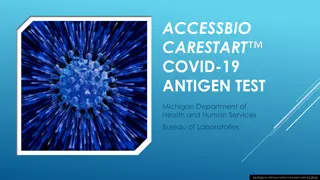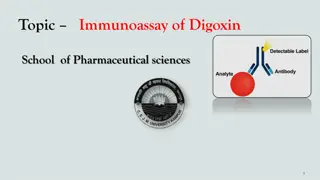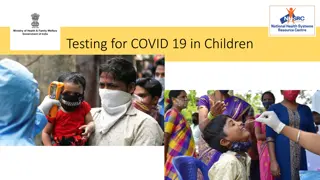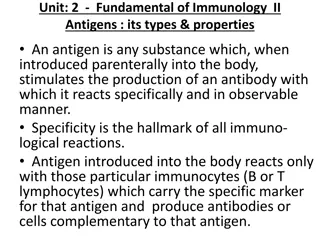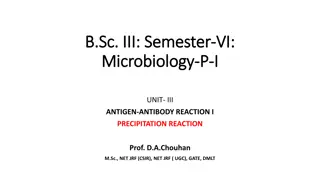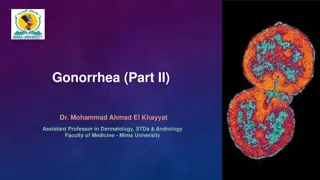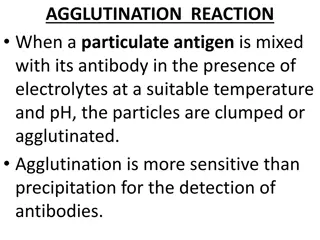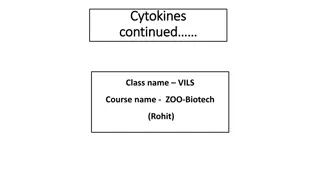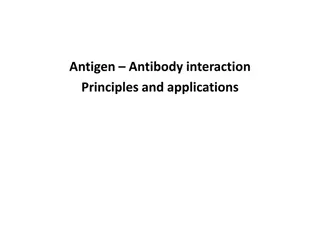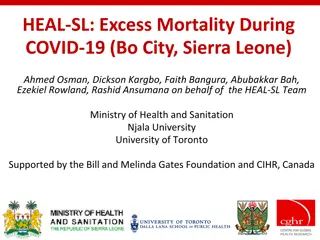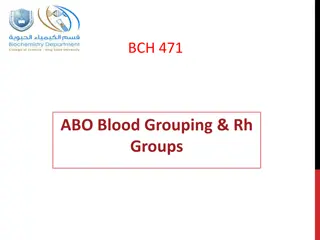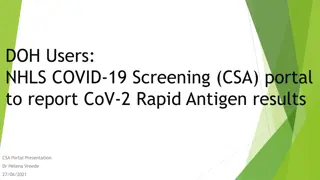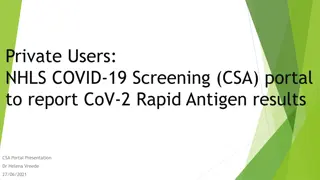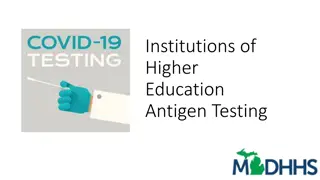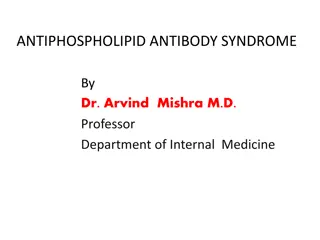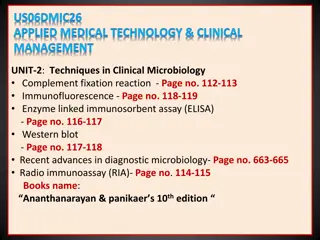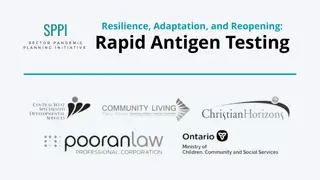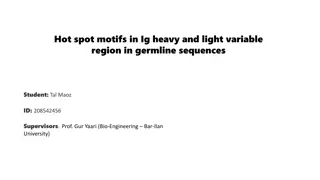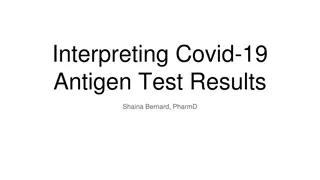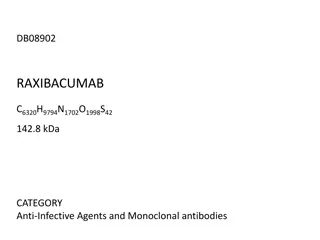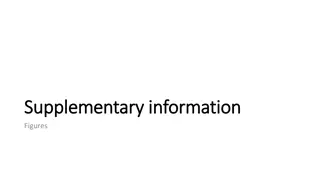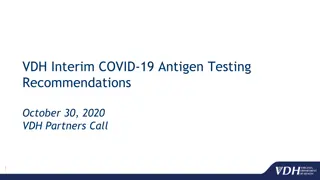Understanding Human Blood Groups and Genetics
Human blood groups are determined by the presence or absence of specific antigens and antibodies. The ABO system categorizes blood into four types (A, B, AB, O), while the Rh factor (D antigen) determines whether blood is RhD positive or negative. Blood group antigens are crucial for safe transfusio
2 views • 14 slides
Targeting human exosomes via bispecific antibody platform
Explore the potential of targeting human exosomes using a bispecific antibody platform, enhancing drug delivery capabilities. The study delves into engineering exosomes as drug carriers, developing exosome targeting antibodies (ExTAbs), and verifying exosome delivery efficiency. Future directions in
7 views • 12 slides
Understanding Blood Groups and Their Significance
Human blood types are determined by specific antigens and antibodies present on red blood cells, influencing crucial aspects like blood transfusions and familial relationships in forensic medicine. The ABO system, with its four main blood types (A, B, AB, O), plays a vital role in categorizing blood
7 views • 14 slides
The Role of Gemtuzumab 4.5 mg in Precision Oncology
\n\nGemtuzumab 4.5 mg is a monoclonal antibody that targets CD33 antigen, which is found on the surface of leukemia cells. In precision oncology, this drug has been used to treat patients with acute myeloid leukemia (AML) who are deemed appropriate for this therapy. It has been shown to increase sur
1 views • 3 slides
Understanding CareStart COVID-19 Antigen Test Procedures and Safety Measures
This overview delves into the CareStart COVID-19 antigen test, touching on its approval status, intended use, safety precautions, how the test works, proper disposal and cleanup methods, and the importance of Personal Protective Equipment (PPE) during testing. The test involves specific procedures w
0 views • 18 slides
Understanding Immunoassay of Digoxin in Pharmaceutical Sciences
Immunoassay is an analytical method utilizing specific antibody-antigen reactions to determine reactant amounts. This method involves competitive binding between labeled and unlabeled analytes and specific antibodies. Antibodies, antigens, labels, and separation matrices play crucial roles in immuno
0 views • 29 slides
Guidelines for COVID-19 Testing in Children
Information on testing for COVID-19 in children, including symptoms to watch out for, when to suspect COVID-19 in a child, when to get a child tested, and recommendations for testing in cases of comorbidities. Details on recommended tests, including Rapid Antigen Test and RT-PCR, along with the impo
1 views • 13 slides
Understanding Antigens and Immunogens: Types and Properties
Antigens are substances that stimulate the production of antibodies in the body, exhibiting specificity in immune reactions. They interact with immune response products like antibodies, BCRs, and TCRs. Immunogens induce detectable immune responses, leading to antibody production or T cell activation
1 views • 30 slides
Immunology Testing in Pernicious Anaemia: A Quick Guide
The article by Dr. Charu, a Consultant Immunologist, provides insights into immunology testing for Pernicious Anaemia (PA). It covers considerations for PA diagnosis, prevalence data, and details intrinsic factor antibody and gastric parietal cell antibody tests. Guidelines for diagnosis and treatme
0 views • 9 slides
Understanding Antigen-Antibody Precipitation Reaction in Microbiology
Antigen-antibody precipitation reaction involves the formation of insoluble products when a soluble bivalent antibody interacts with a soluble antigen. This reaction leads to the formation of a visible precipitate known as a lattice. The mechanism of precipitation, including the prozone phenomenon,
0 views • 20 slides
Understanding Rh Isoimmunization in Pregnancy
Rh isoimmunization is an immunological disorder that affects pregnant Rh-negative mothers carrying Rh-positive fetuses. This condition can lead to hemolytic anemia in the fetus. The Rh antigen is limited to the red cell surface, and the transfer of fetal red cells to the maternal circulation can tri
0 views • 25 slides
Gonorrhea Diagnostic Methods and Tests Overview
Dr. Mohammad Ahmad El Khayyat, an Assistant Professor in Dermatology, STDs, and Andrology, details the diagnostic methods and tests for gonorrhea. Various tests including Gram stain, culture, antigen detection tests, and nucleic acid amplification tests are discussed, highlighting sensitivity and sp
1 views • 30 slides
Understanding Antigen-Antibody Reaction: Agglutination Tests and Coombs' Antiglobulin Test
Learn about the principle and types of agglutination tests, including slide and tube agglutination, used for identifying bacterial isolates and blood grouping. Discover the importance of Coombs' test in detecting incomplete antibodies. Explore the applications and techniques involved in these immuno
2 views • 13 slides
Understanding Agglutination Reactions in Immunology
Agglutination reaction is a key technique in immunology where particulate antigens and antibodies clump together in the presence of electrolytes. This reaction is highly sensitive and often used for antibody detection, bacterial identification, blood grouping, and cross-matching. The process involve
0 views • 20 slides
Understanding the Significance of Cytokines in Immune Response
Cytokines play a crucial role in immune response activation and regulation. They are secreted by various cell types like lymphocytes, monocytes, and macrophages, exerting diverse biological functions, including immune system development, inflammatory response induction, and hematopoiesis regulation.
2 views • 12 slides
Understanding Antibody-Mediated Immunity in Humoral Immunity
This content delves into the mechanisms of antibody-mediated immunity, focusing on B-cells as key players in humoral immunity. It covers topics such as activation of B-cells, clonal selection, generation of plasma and memory cells, primary and secondary immune responses, and the structure and functi
0 views • 20 slides
Understanding Antigen-Antibody Interactions and Diagnostic Tests
Antigen-antibody interactions are essential in immunology, determining disease presence, blood types, and more. Diagnostic tests such as agglutination and precipitation reactions play a crucial role. Specimen collection involves obtaining blood samples for analysis, while precipitation reactions for
0 views • 22 slides
Understanding Antigens and Immunogenicity in Immunology
Learn about antigens, immunogenicity, antigenicity, and epitopes in immunology. Antigens are substances with distinct immunologic properties, while immunogenicity refers to the ability of an antigen to induce an immune response. Antigenicity is the ability of an antigen to combine specifically with
0 views • 41 slides
Understanding Nephelometry and Turbidimetry in Clinical Applications
Nephelometry and turbidimetry are analytical techniques used in clinical settings to measure the amount of light scattered or absorbed by particles in suspension. Turbidimetry focuses on the amount of transmitted light, while nephelometry measures scattered light. Both methods are valuable in determ
0 views • 22 slides
Insights on Excess Mortality and COVID-19 Prevalence in Bo City, Sierra Leone
Study by the HEAL-SL team examines excess mortality during the COVID-19 pandemic in Bo City, Sierra Leone. Findings suggest potential underreporting of COVID-related deaths and highlight the importance of seroprevalence studies in understanding the impact of the virus. The research includes analysis
6 views • 14 slides
Unlocking the Clinical Significance of Alloimmunization in Transfusion Medicine
Alloimmunization, a critical side effect of transfusion, has been a challenge in matching phenotypes and genotypes globally. The detection of clinically significant antibodies requires a delicate balance between sensitivity and specificity, considering various controllable and uncontrollable variabl
0 views • 20 slides
Understanding ABO Blood Grouping and Rh Groups
ABO blood grouping and Rh factor testing are crucial for blood transfusions and forensic medicine. The presence or absence of specific antigens and antibodies in human blood determines blood type. Genetic inheritance from parents establishes blood type, with codominance influencing offspring phenoty
0 views • 13 slides
Why Do We Match Blood for Patients?
Blood matching for patients is crucial to prevent adverse reactions like hemolysis and death. ABO and RhD compatibility testing are fundamental, along with selecting antigen-negative units for patients with clinically significant antibodies. Beyond mandatory requirements, matching can be complex due
0 views • 9 slides
NHLS COVID-19 Screening Application Portal Guidelines
The NHLS COVID-19 Screening Application (CSA) portal is essential for reporting SARS-CoV-2 rapid antigen test results to the National Department of Health in South Africa. It is mandatory to report all rapid test results, including positive, negative, and invalid outcomes. Access to the CSA portal r
0 views • 14 slides
NHLS COVID-19 Screening CSA Portal Information
Providing details on the NHLS COVID-19 Screening Application (CSA) portal for reporting SARS-CoV-2 rapid antigen test results. Accessing the portal, creating patient records, searching for patients, and more essential steps are covered. Find out how to obtain a user code, log in, and navigate the po
4 views • 11 slides
Antigen Testing in Higher Education Institutions
Antigen testing strategies are recommended for institutions of higher education, with rapid results provided by CareStart COVID-19 Antigen Tests. The testing procedure involves sample collection and interpretation of results, including criteria for validity and different outcomes. Regular testing ca
0 views • 13 slides
Understanding Antibody Screening and Pre-Transfusion Tests
In-house cell panel development, pre-transfusion compatibility testing, antibody screening methods, and the importance of ABO and Rh typing are discussed in detail. Steps for safe blood transfusion, reverse ABO grouping, AST testing for irregular antibodies, and selection criteria for screen cells i
0 views • 28 slides
Understanding Antiphospholipid Antibody Syndrome and Its Clinical Implications
Antiphospholipid antibody syndrome is an acquired disorder characterized by recurrent thrombosis or pregnancy complications due to autoantibodies against phospholipid-binding plasma proteins. Learn about its classification, epidemiology, pathogenesis, and diagnostic antibodies. Discover how lupus an
0 views • 35 slides
Serological Work Up: Anti-Jra Antibody in Pregnancy Amid Global Pandemic
Serological work up in an antenatal patient with the identification of a rare anti-Jra antibody, management challenges, and referral for Jra phenotyping. The presence of other significant antibodies excluded, highlighting the importance of accurate blood group testing and potential risks in red cell
0 views • 27 slides
Understanding ELISA: Principle, Types, and Applications
ELISA (enzyme-linked immunosorbent assay) is a widely used laboratory technique for detecting and quantifying antigens or antibodies in blood samples. Introduced in 1971, ELISA involves an antigen-antibody reaction using enzyme-conjugated antibodies to generate a colored product on a plate. There ar
1 views • 14 slides
Clinical Microbiology Techniques: Complement Fixation Test (CFT) in Diagnostic Practice
Complement Fixation Test (CFT) is a key technique in clinical microbiology, utilizing antigen-antibody complexes to fix complement for various immunological reactions. The test involves multiple steps and reagents, with guinea pig serum for complement activation. Standardization is crucial for accur
0 views • 46 slides
Resilience, Adaptation, and Reopening: Rapid Antigen Testing Overview
Understanding the importance of rapid antigen testing in the context of resilience, adaptation, and reopening during the ongoing COVID-19 pandemic. Exploring the benefits of rapid screening in detecting asymptomatic carriers, along with the necessity of confirmatory PCR tests for positive results. H
0 views • 28 slides
Hot Spot Motifs in Ig Heavy and Light Variable Region Sequences
B cells express unique receptors to combat pathogens, with membrane-bound immunoglobulins forming their diverse repertoire. The regions of high variance, known as CDRs, play a crucial role in antigen binding. Ig genes contribute significantly to immune function, with recent studies revealing genetic
0 views • 13 slides
Understanding and Interpreting COVID-19 Antigen Test Results
Infectious disease diagnostics for COVID-19 involve various factors such as clinical context, reasons for testing, test performance characteristics, and community prevalence. Different testing purposes like diagnostic, screening, and surveillance impact the interpretation of results. Antigen tests d
0 views • 7 slides
Understanding Antigen-Antibody Precipitation Reaction in Immunity
The humoral basis of immunity involves the specific reaction between antigens and antibodies, resulting in the formation of insoluble precipitates through a process called precipitation. This reaction plays a crucial role in immune responses against infectious diseases, influenced by factors like af
0 views • 16 slides
Raxibacumab: Monoclonal Antibody for Inhalational Anthrax
Raxibacumab is a human IgG1 monoclonal antibody designed to treat and prevent inhalational anthrax caused by Bacillus anthracis. It targets the protective antigen component of the anthrax toxin, inhibiting its binding to cellular receptors and preventing toxin entry. Administered via IV infusion, Ra
0 views • 6 slides
Understanding Agglutination Test in Laboratory Methods
Agglutination test is a vital laboratory method for detecting antigen-antibody reactions. It involves a two-step process of sensitization and lattice formation, resulting in visible clumping or agglutination. This test is versatile, providing a semi-quantitative measure of antigen or antibody concen
0 views • 13 slides
Analysis of HPV E6 and E7 Peptide Sequences and Antigen-Specific Binders
Alignment of HPV 16 and 18 E6 and E7 protein sequences, highlighting specific peptide positions. The study focuses on isolating HPV antigen-specific binders with HuTARGTM, optimizing library construction for HPV E6 and E7 binders, and examining the sensitivity and near off-target activity of light-c
0 views • 13 slides
VDH Interim COVID-19 Antigen Testing Recommendations
The Virginia Department of Health (VDH) provides recommendations for COVID-19 antigen testing, emphasizing the importance of proper facility accreditation, staff training, and result reporting. It outlines testing scenarios for symptomatic and asymptomatic individuals, with guidelines on isolation a
0 views • 5 slides
Understanding Blood Group and Cross Matching in Transfusion Medicine
Blood group and cross matching play crucial roles in determining blood compatibility for transfusion. The presence or absence of specific antigens on red blood cells, along with antibody reactions, help identify blood types and ensure safe transfusions. Cross matching involves testing donor and reci
0 views • 8 slides




